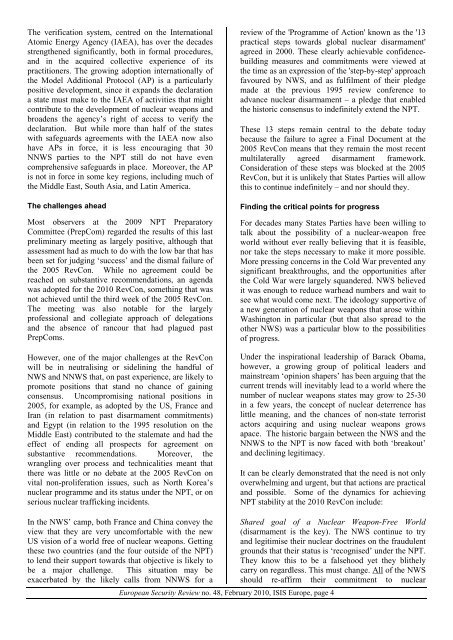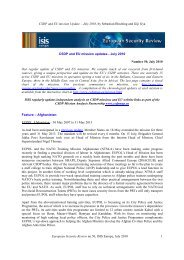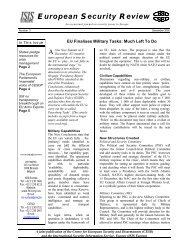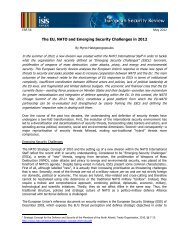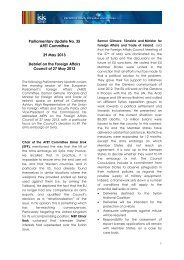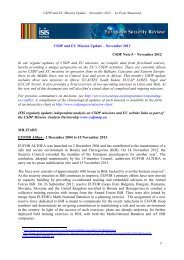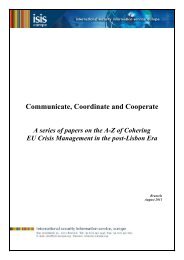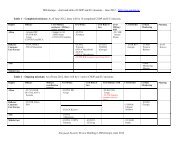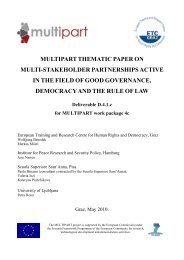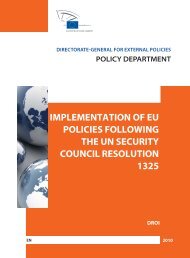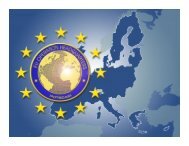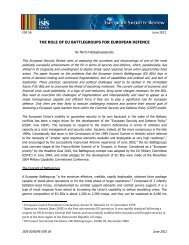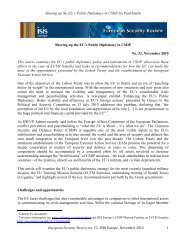ISIS Europe News In This Issue
ISIS Europe News In This Issue
ISIS Europe News In This Issue
Create successful ePaper yourself
Turn your PDF publications into a flip-book with our unique Google optimized e-Paper software.
The verification system, centred on the <strong>In</strong>ternational<br />
Atomic Energy Agency (IAEA), has over the decades<br />
strengthened significantly, both in formal procedures,<br />
and in the acquired collective experience of its<br />
practitioners. The growing adoption internationally of<br />
the Model Additional Protocol (AP) is a particularly<br />
positive development, since it expands the declaration<br />
a state must make to the IAEA of activities that might<br />
contribute to the development of nuclear weapons and<br />
broadens the agency’s right of access to verify the<br />
declaration. But while more than half of the states<br />
with safeguards agreements with the IAEA now also<br />
have APs in force, it is less encouraging that 30<br />
NNWS parties to the NPT still do not have even<br />
comprehensive safeguards in place. Moreover, the AP<br />
is not in force in some key regions, including much of<br />
the Middle East, South Asia, and Latin America.<br />
The challenges ahead<br />
Most observers at the 2009 NPT Preparatory<br />
Committee (PrepCom) regarded the results of this last<br />
preliminary meeting as largely positive, although that<br />
assessment had as much to do with the low bar that has<br />
been set for judging ‘success’ and the dismal failure of<br />
the 2005 RevCon. While no agreement could be<br />
reached on substantive recommendations, an agenda<br />
was adopted for the 2010 RevCon, something that was<br />
not achieved until the third week of the 2005 RevCon.<br />
The meeting was also notable for the largely<br />
professional and collegiate approach of delegations<br />
and the absence of rancour that had plagued past<br />
PrepComs.<br />
However, one of the major challenges at the RevCon<br />
will be in neutralising or sidelining the handful of<br />
NWS and NNWS that, on past experience, are likely to<br />
promote positions that stand no chance of gaining<br />
consensus. Uncompromising national positions in<br />
2005, for example, as adopted by the US, France and<br />
Iran (in relation to past disarmament commitments)<br />
and Egypt (in relation to the 1995 resolution on the<br />
Middle East) contributed to the stalemate and had the<br />
effect of ending all prospects for agreement on<br />
substantive recommendations. Moreover, the<br />
wrangling over process and technicalities meant that<br />
there was little or no debate at the 2005 RevCon on<br />
vital non-proliferation issues, such as North Korea’s<br />
nuclear programme and its status under the NPT, or on<br />
serious nuclear trafficking incidents.<br />
review of the 'Programme of Action' known as the '13<br />
practical steps towards global nuclear disarmament'<br />
agreed in 2000. These clearly achievable confidencebuilding<br />
measures and commitments were viewed at<br />
the time as an expression of the 'step-by-step' approach<br />
favoured by NWS, and as fulfilment of their pledge<br />
made at the previous 1995 review conference to<br />
advance nuclear disarmament – a pledge that enabled<br />
the historic consensus to indefinitely extend the NPT.<br />
These 13 steps remain central to the debate today<br />
because the failure to agree a Final Document at the<br />
2005 RevCon means that they remain the most recent<br />
multilaterally agreed disarmament framework.<br />
Consideration of these steps was blocked at the 2005<br />
RevCon, but it is unlikely that States Parties will allow<br />
this to continue indefinitely – and nor should they.<br />
Finding the critical points for progress<br />
For decades many States Parties have been willing to<br />
talk about the possibility of a nuclear-weapon free<br />
world without ever really believing that it is feasible,<br />
nor take the steps necessary to make it more possible.<br />
More pressing concerns in the Cold War prevented any<br />
significant breakthroughs, and the opportunities after<br />
the Cold War were largely squandered. NWS believed<br />
it was enough to reduce warhead numbers and wait to<br />
see what would come next. The ideology supportive of<br />
a new generation of nuclear weapons that arose within<br />
Washington in particular (but that also spread to the<br />
other NWS) was a particular blow to the possibilities<br />
of progress.<br />
Under the inspirational leadership of Barack Obama,<br />
however, a growing group of political leaders and<br />
mainstream ‘opinion shapers’ has been arguing that the<br />
current trends will inevitably lead to a world where the<br />
number of nuclear weapons states may grow to 25-30<br />
in a few years, the concept of nuclear deterrence has<br />
little meaning, and the chances of non-state terrorist<br />
actors acquiring and using nuclear weapons grows<br />
apace. The historic bargain between the NWS and the<br />
NNWS to the NPT is now faced with both ‘breakout’<br />
and declining legitimacy.<br />
It can be clearly demonstrated that the need is not only<br />
overwhelming and urgent, but that actions are practical<br />
and possible. Some of the dynamics for achieving<br />
NPT stability at the 2010 RevCon include:<br />
<strong>In</strong> the NWS’ camp, both France and China convey the<br />
view that they are very uncomfortable with the new<br />
US vision of a world free of nuclear weapons. Getting<br />
these two countries (and the four outside of the NPT)<br />
to lend their support towards that objective is likely to<br />
be a major challenge. <strong>This</strong> situation may be<br />
exacerbated by the likely calls from NNWS for a<br />
Shared goal of a Nuclear Weapon-Free World<br />
(disarmament is the key). The NWS continue to try<br />
and legitimise their nuclear doctrines on the fraudulent<br />
grounds that their status is ‘recognised’ under the NPT.<br />
They know this to be a falsehood yet they blithely<br />
carry on regardless. <strong>This</strong> must change. All of the NWS<br />
should re-affirm their commitment to nuclear<br />
<strong>Europe</strong>an Security Review no. 48, February 2010, <strong>ISIS</strong> <strong>Europe</strong>, page 4


